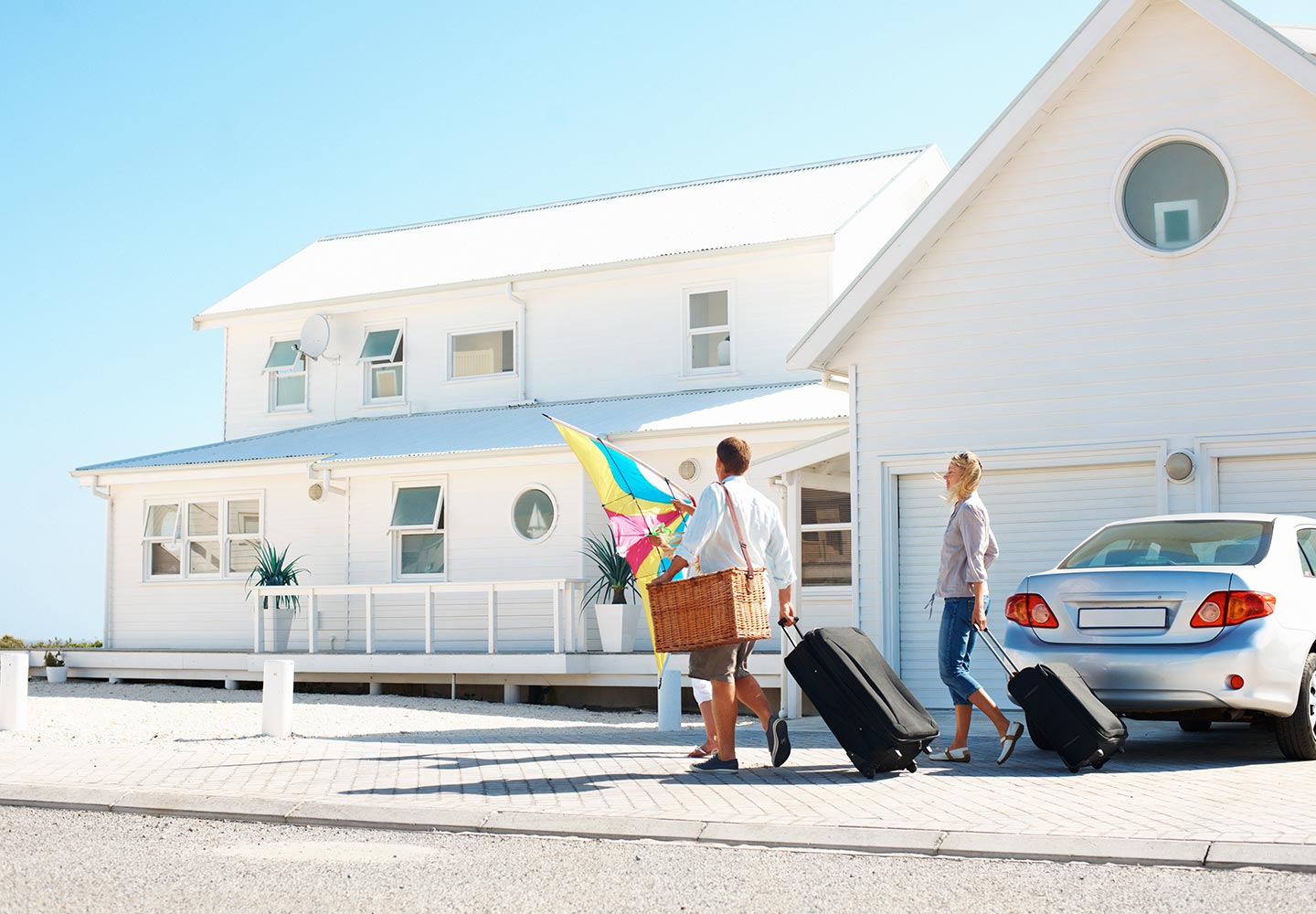Choosing Second Home Insurance [Safeguard Your Getaway]

Owning a second home – whether it's a cozy cabin in the mountains or a sunny beach house – is a dream for many.
Even if you only spend one or two weeks per year in your secondary or vacation home, you should have different types of homeowners insurance, especially second home insurance, to cover it.
This protects your investment and saves you from paying a lot of money if a fire or other event causes damage.
This article will cover everything you need to know about second home insurance, from what it is to how much it costs and more.
Key takeaways
- Second home insurance provides coverage for your secondary property, protecting it from various risks such as fires, theft, weather-related damages, and personal liability.
- The home's age, condition, amenities, and location can affect the amount of second home insurance you pay.
- There are numerous ways to save on second home insurance, including bundling policies and installing smart home devices.
What is second home insurance?
Second home insurance is a type of coverage for a property separate from your main residence. For example, this can be a condo you rent out or a vacation home you visit in the summer.
Since a second home insurance policy covers properties you don't live in full-time, they are more vulnerable to risks such as burglary and fires. This makes insuring a second home more riskier than insuring your primary residence.
Moreover, depending on the location of the second home, its contents, and other factors, you may also need additional coverage (like fire insurance or theft insurance).
Can you insure two homes under the same insurance policy?
Typically, you can't insure two homes, like your main residence and a secondary home, under one policy because they have different risk factors.
You'll likely need a separate home insurance policy to protect your second home and its valuables. This way, you ensure that both properties receive the appropriate level of protection.
In addition, managing claims and coverage details is often easier with separate policies tailored to each home's unique needs.
What does second home insurance cover?
Secondary home insurance is very similar to your coverage for the primary residence – including what it covers. However, second home house insurance may not be as comprehensive.
Homeowners insurance usually covers potential causes of damage or perils, while second home insurance policy only covers named perils. This means it only covers certain risks listed in the policy.
Some common perils covered by homeowners insurance include:
- Fire & smoke
- Explosions
- Lightning
- Civil unrest
- Crimes such as vandalism & theft
- Falling objects
- Volcanic eruption
- Hail or windstorms
- Weight of snow, ice, or sleet
If one of these perils causes damage, your second property insurance will cover it according to your policy. Basic home insurance policies include different types of coverage, such as:
- Dwelling Coverage (Coverage A): Protects your home structure and major components, such as plumbing and HVAC, against risks like storms, fire, and vandalism.
- Other Structures Coverage (Coverage B): It helps protect other buildings or structures on your property, like a gazebo, garage, or shed.
- Personal Property Coverage (Coverage C): This coverage protects items within your home, such as furniture, clothes, and sports equipment.
- Additional Living Expenses Coverage (Coverage D): Helps pay for extra expenses if your house becomes uninhabitable, such as hotel stays or storage space.
- Liability Coverage (Coverage E): Personal liability insurance coverage helps cover legal costs and damages if someone sues you for injuries sustained on your property.
- Medical Payments Coverage (Coverage F): It helps pay for medical bills if someone outside your home is injured on your property.
You can always add additional coverage or insurance riders to your insurance for a second home based on specific risks.
However, since some home insurance for second home policies only covers certain named perils, it's important to know exactly what your policy includes.
Make sure to check your provider's insurance binder to ensure you have comprehensive protection.
What does second home insurance not cover?
Although second home insurance for family members typically covers a range of circumstances, you must check what the policy doesn't cover.
Homeowners insurance often has exclusions, which means they don't cover everything. If your second home insurance coverage has named perils, it only covers what is listed.
Some common exclusions in homeowners insurance policies typically include:
- Earthquakes
- Flooding
- Sewer backups
- Normal wear & tear
- Damage from lack of maintenance
Since insurance on a second home can have limited coverage, here are a few things that aren't covered, which you may consider adding to your policy:
- Umbrella Policy: The umbrella insurance policy can be highly beneficial if the damage to the second home exceeds the limits of your basic home coverage.
- Flood Insurance: Regular homeowners insurance doesn't cover flood damage. If your second or vacation home is near water, a flood insurance policy can be important.
- Hurricane or Earthquake Insurance: If your second home is in an area prone to various natural disasters, such as earthquakes or hurricanes, consider adding earthquake insurance and hurricane insurance.
How to insure a second home
Getting insurance for a second home starts with understanding that the process differs from insuring your primary residence.
Often, secondary homes are considered riskier to insure. This means you'll need different property and casualty insurance, which will likely be more expensive.
Since you won't always be there – which makes it more prone to burglary – having solid home insurance for a holiday home is crucial.
Below are the two ways you can insure your second home, whether a rental property or a vacation home.
Vacation home insurance
Insurance for vacation homes depends on several factors, such as location, property type, and belongings.
The associated risks depend on where your home is. For instance, a remote cabin in the mountains is more susceptible to snowstorms and wildfires, requiring more coverage, such as fire insurance, to insure it fully.
As with any apartment or house, age and condition play a key role in its safety. Older or unique buildings may need special insurance.
However, if you dwell in townhouses or condos, you may have lower insurance costs because landlords provide security. Still, having HO-6 insurance for condominium and co-op owners is advisable.
Single-family homes without security systems may cost more to insure.
Besides the structure and location of your home, it's important to insure valuable items. Items like pools, artwork, firepits, or expensive gadgets should be insured against accidents or damage.
Make sure to evaluate these factors to ensure your vacation home is well-protected.
Rental home insurance
If you rent out your second home, you'll likely need a different type of insurance.
Secondary home policies usually only cover owner-occupied homes, meaning you're the primary user. Renting it out may require additional rental insurance.
Some insurers offer short-term or temporary rental insurance riders to protect your home during rental periods.
However, if you intend to rent your secondary home for longer terms, you may require landlord insurance (which covers the structure, liability, and sometimes loss of rental income) or a rental dwelling insurance policy, including renters liability insurance.
Before renting out your second home, consult the insurance provider to determine the right coverage.
How much does second home insurance cost?
Insuring a second home can be expensive—it may cost two or three times more than primary homeowners insurance.
Typically, second-home insurance rates range between $2,000 and $3,000 per year. In contrast, the average cost of homeowners insurance in America ranges from $996 to $2,437 per year.
The actual cost you pay for homeowners insurance for a second home will depend on various factors, such as:
- Location: The risk level of your home's location can greatly affect the cost. For example, homes in remote areas may be more expensive to insure because fire services could take longer to arrive. Houses near waterways may also experience a higher flood risk.
- Type of Home: Whether you have a townhouse, a condo, or a standalone house can impact the cost of secondary home insurance. Condos may be cheaper to insure because the association manages the security and maintenance.
- Condition and Age: In addition to location, your insurance company will consider the age and condition of the home. Older homes or those with poor maintenance are usually more expensive to insure than newer, well-maintained homes.
- Special Features: Amenities such as hot tubs or pools can also increase insurance costs due to the additional risks they pose.
Tips to save on a second home insurance policy
Worried about the cost of insurance for holiday homes? If so, follow the tips to the T to save money on house insurance for a second home.
- Select a Lower-Risk Area: Instead of picking an isolated mountain retreat, choose a home closer to town. This can lower your insurance costs. You can also choose a residence in a safer location or find a home that's part of an HOA insurance, which may qualify you for savings and help you avoid claims.
- Bundle Insurance Policies: If you get your homeowners insurance for a second home from a similar company that insures your primary residence, you may receive a discount.
- Install Security Features: You can also set up a security system to prevent burglaries or install smart home devices to protect against other threats. Devices such as water leak sensors, smoke detectors, motion sensors, and smart locks can help you save more on insurance.
- Search around: Get second home insurance quotes from various providers before choosing a policy. Different companies have different policies for vacation or second homes, and shopping around can help you find the best deal.
Still have questions?
Interested to learn more about second home insurance? Here are some frequently asked questions.
Is second home insurance more expensive?
Yes, second home insurance is often more expensive than primary home insurance due to the additional risks associated with properties that are not occupied year-round. The cost varies based on location, property value, and coverage needs.
What kind of homeowners insurance do I need for a second home that I inherited?
For an inherited second home, you need a policy that covers the property's unique risks, including potential structural issues and maintenance needs. Ensure the policy includes coverage for theft, fire, and personal liability.
Can you have two home insurance policies?
Yes, you can have two home insurance policies if you own multiple properties. Each home should have its own policy to ensure adequate coverage for its specific risks and needs.
It's important to work with your insurance provider to manage and understand the terms of each policy effectively.



